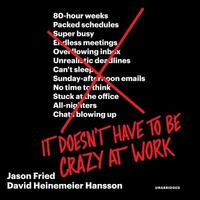Take a photo of a barcode or cover
Similar to previous Basecamp books — interesting, and with some very inspirational and thought-provoking ideas, but also mixed with some advice that's more dubious (sweeping generalizations for something that may be either not repeatable or not broadly applicable).
Still, Fried and DHH seem to be some of the few corporate leaders in the world who are trying to build a company that aims to be efficient and sustainable. Most others seem to be chasing much more questionable values like maintaining an illusion of work that's really just frantic busy-ness, or hyper-growth-at-all-costs which leads to a top-heavy pyramid that's 95% communication and 5% productive progress. I, for one, appreciate that.
Still, Fried and DHH seem to be some of the few corporate leaders in the world who are trying to build a company that aims to be efficient and sustainable. Most others seem to be chasing much more questionable values like maintaining an illusion of work that's really just frantic busy-ness, or hyper-growth-at-all-costs which leads to a top-heavy pyramid that's 95% communication and 5% productive progress. I, for one, appreciate that.
I liked it, and it was quite insightful. But there were just a few parts that I wished they dived deeper into. Overall, it was a great read and I definitely wish calm at work.
Good read and offers many interesting perspectives. I felt Remote was more powerful - but that's just my own opinion. An important read for anyone in any situation. Question what's happening.
This book has become one of my recent favorites. From the employee's perspective, I've always thought it's really hard for the people in the leadership team to choose between the company or the employees. Leading me to think that it's not bad, if we are in the position to work past our business hours or compromise our vacation days. But the authors have beautifully explained that it's the choice not a mandate to choose company over the employees.
"Whatever it doesn't take", "Know No" and "Startups are easy, stayups are hard" chapters are so impressive and deep. Staying calm is a choice. Like the book suggests, any company should try to incorporate atleast not all of the methodologies that basecamp follows but a few of them to ensure the employee's benefit.
I've felt burnt out most of the time at my work. The work I'm currently doing is the one I chose out of passion, but the company has the influence of even turning the passion to hatred. This book should be distributed to all the employees and the people in the leadership and the management team of a Company.
I cannot stress on how impactful this book can be when these methods are inculcated in our daily work life, I am pretty much sure, it can bring wonders.
"Whatever it doesn't take", "Know No" and "Startups are easy, stayups are hard" chapters are so impressive and deep. Staying calm is a choice. Like the book suggests, any company should try to incorporate atleast not all of the methodologies that basecamp follows but a few of them to ensure the employee's benefit.
I've felt burnt out most of the time at my work. The work I'm currently doing is the one I chose out of passion, but the company has the influence of even turning the passion to hatred. This book should be distributed to all the employees and the people in the leadership and the management team of a Company.
I cannot stress on how impactful this book can be when these methods are inculcated in our daily work life, I am pretty much sure, it can bring wonders.
It was a quick, light read and yet packed a lot of meaning for me. I found myself highlighting whole passages, stopping myself only because I'll end up highlighting the whole chapter. It woke me up to things I should've known but have lately lost sight of. It made me realize just how deeply rooted some toxic hustling culture teachings have been in me. It was so refreshing to read, really enjoyed it.
As usual, their work is refreshing. If you've read Rework, it's basically the same thing but said better and more concisely, but more imperatively.
Also, whenever I read over Basecamp's benefits I get a little weepy. Why can't every business *care* about people a little more? (I know the answer.)
Also, whenever I read over Basecamp's benefits I get a little weepy. Why can't every business *care* about people a little more? (I know the answer.)
Another great read in the same vein of REWORK & REMOTE
informative
reflective
fast-paced
medium-paced




